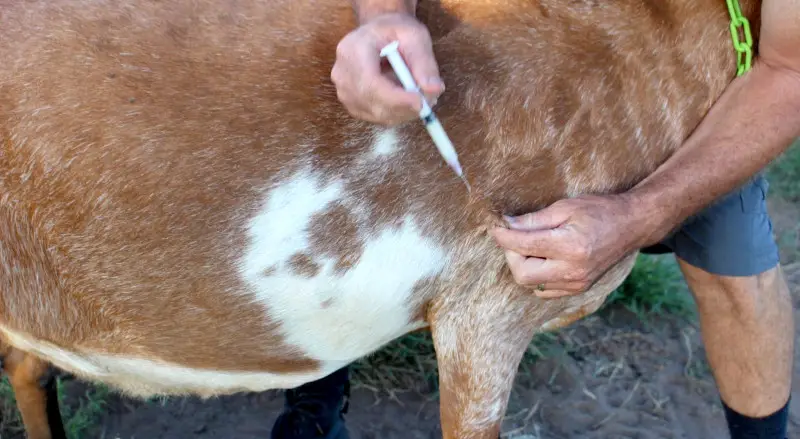Goats are considered as minor ruminant species constituting a low percentage in the overall domestic farming venture worldwide. To exacerbate the situation, the number of global commercial farmers practising this farming method are rapidly declining. As a result, most medical agricultural research is not focused on developing medication specifically for goats. Most medicine for ruminants do not include goat specific labels and dosages. For this reason, it is a struggle to get the appropriate goat pain medication. Goats metabolize medications differently than other animals; drugs clear their system faster. As such, they require varied doses of drugs for effective treatment. Goat breeders must therefore be familiar with different pain medication for goats in order to administer effective treatments and avoid unnecessary errors that can be harmful to animal health. Note that it is important to contact a knowledgeable veterinary medical professional prior to treating animals.
Table of Contents
Aspirin
Aspirin is an anti-inflammatory and pain reliever medicine. It is recommended for use by goats in cases where pain relief and fever reduction is necessary. Aspirin are some of the goat pain medication ideal for use during infection, muscle damage, arthritis, and joint pain. Note that goats have the ability to metabolise medication rapidly and so there may be need to give higher dosages of aspirin. The dosage depends on the severity of the pain and the physical stature of the goat. Larger goats may need more dosages compared to small sized breeds. If the goat is teeth grinding indicating pain, one baby aspirin (81mg) is recommended for each 4.5kg of weight. Treatment must be continued for as long as the pain persists but should not exceed 3 consecutive days. Since many products are not recommended for use as goat pain medication, it is essential to refer to extra-label drug use. An overdose of aspirin medication can cause stomach and intestinal irritation as well as ulceration. As such, farmers should be cautious when administering aspirin. If signs of abdominal pain occur, or if there is blood or dark, tar-like material in the faeces, aspirin and all anti-inflammatory agents should be discontinued immediately.
Ibuprofen
Ibuprofen can be used as goat pain medication. It is generally a pain killer and anti-inflammatory medicine that is often in the form of tablets. Ibuprofen are also effective in fever reduction. As stated previously, goats usually require increased dosages compared to most ruminants and so the suggested dose is approximately double the human dosage. Note that it is advisable to administer Ibuprofen when other goat pain medication such as Aspirin have been exhausted. It is also advisable to offer Ibuprofen after a consultation with a specialist veterinary medical practitioner. Similar to Aspirin, the milk withholding time is 24 hours. Ibuprofen are strong medication hence should be used with caution. An overdose can cause kidney and liver damage, gastric ulceration as well as bleeding of the stomach lining.
Banamine
Banamine, also referred to as Fluxixin Meglumine, is a fever reducer, pain killer and anti-inflammatory medication. It is also used to manage goat joint pain and soreness associated with animal bites and other injuries. Banamine is often acquired through prescription and is in the form of injections. The recommended dosage is 1cc per 4.5kg weight. The milk withdrawal period is 72 hours. Be aware that Banamine should not be used more than 3 times. It is advisable to administer this type of goat pain medication once in 36 hours. An overdose of Banamine can cause permanent damage to the kidney and liver. It can also result in stomach ulcers and death. As such, farmers to be very cautious when administering Banamine to goats.
Dexamethozone
Dexamethozone is used to induce labour and stimulate lung as well as system development. It is also regarded as an anti-inflammatory and a pain reliever. It is used for swelling and inflammation once infection is under control. The suggested dosage for goats is 1cc per 9kg or 1 to 2.5ml per animal (9kg). Dexamethozone requires milk withdrawal period of 3 days; meat withdrawal time can be up to 8 days. This type of goat pain medication is usually accessed with a prescription which is advisable. If used for more than 24 hours, it must be administered with an antibiotic or immune stimulating herbs. This is because it suppresses the body’s natural immunity while being used, thus leaving the animal open to infection. The side effects of Dexamethozone include polydipsia, poly-uraemia, immunosuppression, muscle atrophy, delayed wound healing, influences fat metabolism. Note that Dexamethozone goat pain medication should not be administered to animals with diabetes mellitus, osteoporosis, an impaired heart or kidney function.
Ketoprofen
Ketoprofen is a non-steroidal anti-inflammatory that helps reduce swelling and temperature. It also acts as goat pain medication often prescribed by veterinary doctors to relieve pain and discomfort. Ketoprofen is most commonly prescribed for musculoskeletal pain from soft tissue injury, osteoarthritis, or other bone and joint problems. It may be used to reduce or control fever caused by viral or bacterial infections. Ketoprofen may be administered by injection or orally. The recommended dosage is 1mg per 4.5kg of body weight. Onset of activity is within two hours with peak response by 12 hours. Ketoprofen has a milk withdrawal period of 72 hours. Side effects include ulceration of the tract and a drop in the red blood cell count due to bleeding. Rare side-effects include kidney damage, bleeding disorders, and protein loss. Take care not to administer this form of goat pain medication in animals that are allergic to Aspirin. In addition, avoid combining with other anti-inflammatory drugs that tend to cause ulcers, such as corticosteroids. Farmers should be cautious when administering Ketoprofen to goats as it can cause ulcers, protein loss as well as kidney and liver damage. Early signs of toxicity include loss of appetite among other factors.
Although pain medication specifically developed for goats is in short supply, there are various medicine than can be administered. When using such medicine as goat pain medication, it is highly advisable to consult a veterinary medical professional so as to avoid making detrimental errors. Also, farmers should make sure that they do not overdose the medication. Goat pain medication should be stopped if negative effects occur.

